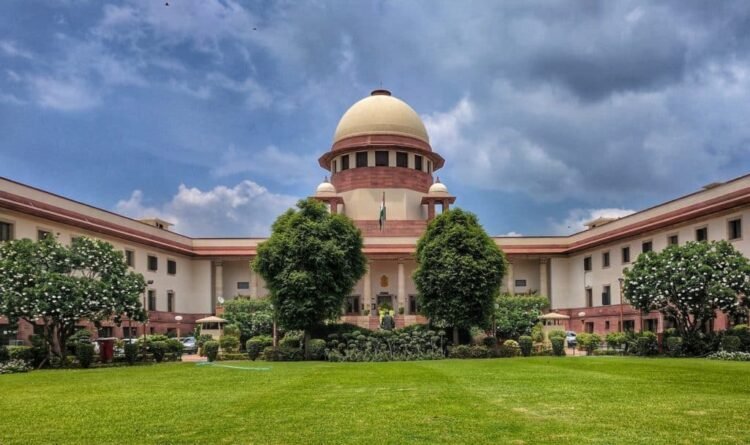Supreme Court Rules on Sub-classification
NEW DELHI (India CSR): With this decision, the Supreme Court has granted states the authority to create sub-categories within the SC/ST reservation groups. The constitutional bench, by a 6:1 majority, has overturned its own 20-year-old decision.
Supreme Court Rules on Sub-classification
In a significant ruling on Thursday, the Supreme Court stated that states can sub-classify reserved category groups (SC/ST) based on their relative backwardness to provide reservation benefits. This means that SC/STs can be given sub-category reservations. The top court justified such sub-classification to provide separate quotas for marginalized backward groups. Alongside, the Supreme Court overturned its 2004 decision which had stated that sub-categories for SC/ST reservation cannot be created.
Sub-classification Not Accepted: Justice Bela M. Trivedi
The constitution provides a 15% reservation for Scheduled Castes. Several states have added sub-quotas within this reservation. There were 23 petitions filed in the Supreme Court on this matter. The seven-judge constitutional bench, led by Chief Justice D.Y. Chandrachud, delivered the verdict with a 6:1 majority. Justice Bela M. Trivedi dissented, stating that such sub-classification is not acceptable.
Article 15 and 16 Do Not Prevent Classification: CJI D.Y. Chandrachud
Reading the decision, CJI Chandrachud stated that the criteria used for identifying Scheduled Castes show diversity within the groups. Articles 15 and 16 do not prevent states from sub-classifying castes. However, sub-classification should be justified with quantitative and demonstrable data. The bench included Justices B.R. Gavai, Vikram Nath, Pankaj Mithal, Manoj Mishra, and S.C. Sharma. After hearing the case, the bench reserved the decision on February 8, 2024.
5 Key Points of the Constitutional Bench’s Decision:
- Quota Inclusion and Exclusion: Groups should not be included or excluded from quotas merely for political appeasement. It should be ensured that the most backward castes within these groups receive reservations.
- Diversity Within SCs: The SC category is not homogenous. Different castes within it face varied discrimination and issues.
- State Governments’ Role: State governments can decide sub-quotas based on which castes face more discrimination. SC/ST individuals often cannot progress due to systemic discrimination.
- Ground Survey for Sub-quota: Sub-quotas should be based on ground surveys to determine the representation of each caste in government jobs and educational institutions.
- Judicial Review of Sub-categories: States’ decisions on sub-categories can be subject to judicial review. States must justify the criteria for determining backwardness.
Four Judges Advocate for Creamy Layer in SC Quota
Justice B.R. Gavai stated that states should identify the creamy layer within SC/STs. The benefits of reservation should be provided to the deprived, excluding those who have already availed of its benefits. Justice Gavai, from the SC community, emphasized the need for states to create policies for identifying the creamy layer within SC/STs. Justice Vikram Nath concurred, stating that the criteria for excluding the creamy layer could differ from those for OBCs. Justices Pankaj Mithal and S.C. Sharma added that if a family has progressed through reservation benefits, future generations logically should not be eligible.
Justice Bela Trivedi’s Dissenting Opinion
Justice Bela M. Trivedi dissented, stating that when SC quotas are based on caste, there is no need for further division. Without executive or legislative power, states cannot sub-classify the reserved benefits for SC/ST individuals. She argued that sub-classification would be akin to tampering with the President’s notification under Article 341(2).
Path to Benefits for the Deprived
This decision will benefit Dalit sub-castes with relatively less representation in various states. For example, in Uttar Pradesh, Jatavs and in Bihar, Paswans are relatively better off compared to other Dalit sub-castes. Sub-quotas for castes like Musahar, Valmiki, and Dhobi can provide them significant benefits. Similarly, in states like Punjab and Haryana, sub-classification within Dalit quotas will ensure that reservation benefits reach every caste.
(India CSR)
📢 Partner with India CSR
Are you looking to publish high-quality blogs or insert relevant backlinks on a leading CSR and sustainability platform? India CSR welcomes business and corporate partnership proposals for guest posting, sponsored content, and contextual link insertions in existing or new articles. Reach our highly engaged audience of business leaders, CSR professionals, NGOs, and policy influencers.
📩 Contact us at: biz@indiacsr.in
🌐 Visit: www.indiacsr.in
Let’s collaborate to amplify your brand’s impact in the CSR and ESG ecosystem.






























